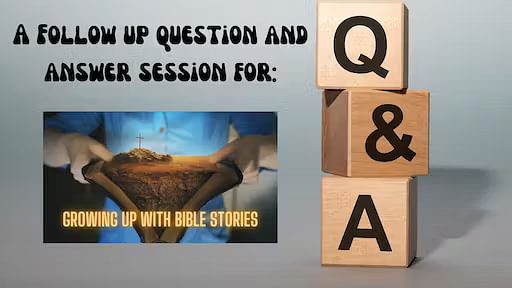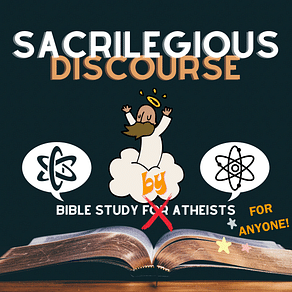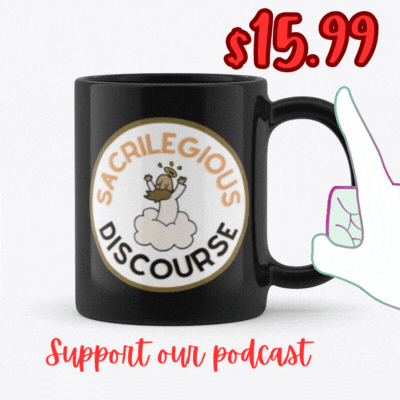
Read the original article here: Growing up with Bible Stories
Did your parents/church ever address why you were the only ones who held services on Saturdays?

While for the sake of brevity I am oversimplifying the story I was taught, it is not nearly so great an oversimplification as that made by the SDA church when explaining this history to the lay audience. I can’t speak to the truth of the matter with any real authority, but I’m certain that this was not how it actually happened. The reality was probably a good deal more complicated and nuanced, and was also more likely a bottom-up decision than a top-down one.
What did a "normal" day look like to you (as opposed to Saturdays)?

My class had fewer than 30 students in it. The day would open with a pledge of allegiance to the American flag as well as to the Christian flag, and then we would sing a few patriotic and religious songs. From there, the school day would progress more or less like any ordinary school day, with classes, recess, lunch, and so on until the end of the day. The big differences would be that there was a subject called Bible, and that all the textbooks would have some kind of religious teaching in them.
After school, the bus would take me back to the public school, and then another bus back home. At home I was expected to do my homework before anything else, and once that was done I was free to do as I pleased. I would pray before every meal, and I usually said the prayer aloud each evening at supper. At night, I would listen to Bible story tapes to help me fall asleep.
Do you have any fond memories of religious practices that your family did?

What age did you start questioning religion?

Did you lose friends or family when you left religion?
Some. My family never rejected me, though some familial relationships are more strained now than they had been. The friends I lost were not particularly close, and mostly we just lost contact because we stopped trying to stay in touch, though I have found it difficult to stay in touch with my more religious friends than my secular ones.
How long did the process of leaving religion take for you?
It was about two years between when I set myself the task of answering the questions I had and the point where I realized I was an atheist. Of course, I’d had some nagging questions in the back of my mind before I started, and I didn’t have everything figured out by the end of that period, but that’s the time when I was going through the most rapid and intense changes in worldview.
What was the impetus for you to start questioning your religion?
What really got me to start seriously questioning my faith was the death of my 15-year-old cousin. She committed suicide due to a combination of mental health issues, a recent change in medications, and bullying at school. The event hit our entire family hard, and it was the first time in my life that I had ever really suffered. It opened my eyes to what others must go through when they lose children in natural disasters or suffer a severe injury or are the victims of some horrible crime. I became determined that I was going to figure out how a loving God could stand by and watch while all these awful events took place and not step in to prevent them.
Do you have a favorite religious song?

If I think only about the broad message of the song, absent the religious packaging, I can appreciate songs like Thank You by Ray Boltz, which is about going the extra mile to help other people.
If I’m picking my favorite religious song in terms of its unintentional humor, it’s Draw Me Close by Michael W. Smith, which sounds like a love song written by a co-dependent, and never once mentions God, Jesus, church, or anything else religious. There’s only a vague “you” to whom the song is addressed (implicitly it’s God/Jesus, but it’s never said explicitly anywhere).
Did you ever have a point in your religious upbringing where you thought you wanted to do MORE for the church?
And if so, what were your aspirations with regard to that prior to leaving/questioning religion?
Yes, and the older I got, the more I felt this way. Much as I found some church activities to be dull and/or annoying, I really believed that going all-in on Christianity was the right thing for me to do. After my first year of college at a local secular university, I started to feel like God was calling me to some kind of ministry. I didn’t know what, exactly, whether it would be pastoring, mission work, or something else, but that’s what I believed God wanted me to do, so I enrolled in an Adventist university on the other side of the country with a major in Religion. That was my leap of faith, and in my first year there, I started questioning everything I’d been taught.
Do you or your parents still have any of your crafts you made in Sabbath school or VBS?
My mom might have something tucked away in the attic somewhere, but I’m pretty sure I don’t have anything. I’ve been through six moves since I first left for college, and none of that stuff held special importance to me.
Did your religious schooling stifle your progression in learning at all?
Yes, but only when it came to science, and only certain fields of science. I didn’t learn much about geology and cosmology, and what I was taught about evolution was completely wrong. Also, despite the incredible amount of Bible content I learned about, many of the aspects of history I was taught (both in school and in church) related to the Bible and Christianity were wrong. However, the Adventist college I attended did teach me the truth about Biblical scholarship and how the Bible was assembled, which helped to further divide me from Christianity.
I'm curious because I was a boy scout, but... What did a typical Pathfinders meeting look like?

The meetings began with everyone falling in. There would be a prayer, announcements, and maybe a pledge to the American Flag, though I don’t remember for sure. Then there was usually a class of some kind, teaching a skill such as knot tying or CPR. Then we might practice drilling for a few minutes, then a game or some other physical/outdoor activity, and finally a worship service to close things out.
Camporees and classorees would have all the same general elements, but more of them, and they would take place with multiple Pathfinder clubs from around the area. The focus of a camporee was usually more on fun and worship, while a classoree would be focused on skills and earning badges, which they call honors. There would also be camping trips with only one or perhaps two clubs in attendance. Such events would usually take place on a weekend, or perhaps a long weekend, so that the kids would have time to attend. Of course, the biggest event in the Pathfinders calendar is the International Camporee, which takes place once every five years. Pathfinder clubs from all over the world gather at a huge venue for a week. I went to one, and it was an unforgettable experience. The energy there was something akin to a rock concert, music festival, or convention.
Where did you go on your mission trips? What were the mission trips like? Did you have "work" or any specific expectations to fulfill while on mission trips?
My first mission trip was to a Navajo reservation in Utah; the second was to Tanzania; and the third to the Philippines.

In Utah, we were mostly doing odd jobs. I helped rebuild a fence, but other members of the group painted a house, while others ran a Vacation Bible School. It was hot, thirsty work, and we were grateful any time someone came by with cold water. I’m sure there were other jobs, but I can’t remember what they were. On the way back home, we took the opportunity to see Four Corners and the Grand Canyon.
The other two trips were with an organization focused on evangelism. The organization provided us with slideshows, computers, and projectors, and they coordinated with local Adventist churches to advertise the events and provide the basic infrastructure, such as transportation, seating, electricity, and sound equipment. They also provided us with translators so that we could preach in English. Because we used projectors, and because we preached nearly every day of the week, we went to work in the evenings, and had the day free to prepare our talks and do any other business we had. That ensured that the audience could see our slides, and that the presentations were less likely to coincide with their work.
Our whole group would stay in a hotel and eat our meals together. Eating local fruit that was properly ripened was a highlight for me. We would also hold regular group devotionals and share our stories about what had been going on at the different sites where we preached. The slideshows that we were given would always be too long to fit into the amount of time we were given, and so we had to remove a lot of the slides to condense the messages. When it was time for us to preach, we would head out to different sites in the local area, which was often an adventure in itself. I ended up riding on the back of a motorcycle to reach my destination more than once in both countries because other, less hazardous forms of transportation were temporarily unavailable. After giving our talks, we would take a bit of time to interact with the people, then return to the hotel and go to bed.
The preaching trips were especially draining, and affected our health, as well. In Africa, the air was so dusty that everyone was coughing pretty regularly, and I came home with a case of mechanical pneumonia and a benign rash. One of the members of our group suffered a heart attack on our last night, and had to receive emergency medical treatment. We prayed for him fervently, and if the medically-trained members of our group hadn’t insisted on taking him mid-prayer, he might not have ever gotten the help he needed. Fortunately, they were able to find some medication for him nearby and he survived, even if his return home was a bit delayed.
My trip to the Philippines came at a bad time for me. I was about a year into my deconversion process, and was uncomfortable with some of the theology I was preaching. I was starting to have serious doubts about Christianity by this time, and my heart was not in the preaching, even though I still loved interacting with the people and exploring a new place. Near the end of the trip, however, I suffered my first bout of somatic symptoms, which left me unable to walk and severely fatigued. I ended up going to a nearby hospital, but they were unable to find anything wrong with me. I rested in bed with an IV overnight before returning to the hotel, able to walk again, but still very drained. Someone else preached the last few sermons at my site, except for the very last one, when I returned for the sermon on heaven. Between my fatigue and lack of enthusiasm for the subject, I don’t think I did very well with that last sermon.

The mission trips I went on are some of the high points in my life. Getting to travel and see how different people live around the world was a big eye-opener for me. I just wish I hadn’t spent so much of those trips spreading harmful ideas.






